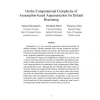Free Online Productivity Tools
i2Speak
i2Symbol
i2OCR
iTex2Img
iWeb2Print
iWeb2Shot
i2Type
iPdf2Split
iPdf2Merge
i2Bopomofo
i2Arabic
i2Style
i2Image
i2PDF
iLatex2Rtf
Sci2ools
113
click to vote
AI
2002
Springer
2002
Springer
On the computational complexity of assumption-based argumentation for default reasoning
ko et al. have recently proposed an abstract framework for default reasoning. Besides capturing most existing formalisms and proving that their standard semantics all coincide, the framework extends these formalisms by generalising the semantics of admissible and preferred arguments, originally proposed for logic programming only. In this paper we analyse the computational complexity of credulous and sceptical reasoning under the semantics of admissible and preferred arguments for (the propositional variant of) the instances of the abstract framework capturing theorist, circumscription, logic programming, default logic, and autoepistemic logic. Although the new semantics have been tacitly assumed to mitigate the computational hardness of default reasoning under the standard semantics of stable extensions, we show that in many cases reasoning under the admissibility and preferability semantics is computationally harder than under the standard semantics. In particular, in the case of au...
Related Content
| Added | 16 Dec 2010 |
| Updated | 16 Dec 2010 |
| Type | Journal |
| Year | 2002 |
| Where | AI |
| Authors | Yannis Dimopoulos, Bernhard Nebel, Francesca Toni |
Comments (0)

